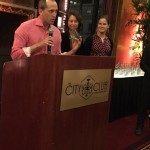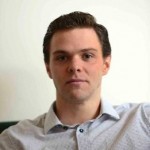KALW and its Audio Academy Dare to Tell Great Stories, and Win Journalism Awards for Their Efforts
By Guest Bloggers Ben Trefny and Jack Detsch
Ben Trefny, News Director, KALW
Many members of my team and I traveled to Chicago last Friday for the Third Coast International Audio Festival, and we were engaged all weekend. That’s part of what gives me plenty to write about this week – one of the most remarkable stretches ever for our news department.
Last week was election week. Twelve members of our news department, including Audio Academy members Hannah Kingsley-Ma, Lina Misitzis, Raja Shah, and Liza Veale collaborated to put together live election coverage for KALW. We worked through the evening, producing seven live newscasts with field reports for our audience. And we put together an updated eight-minute story for the Crosscurrents Morning Report that aired at 6:51 a.m., noting the new mayor of Oakland (which the newspapers were not able to report at that time).
Here’s what we worked together to make:
Then, there was the Third Coast International Audio Festival over the weekend. Something like a dozen of people actively working with our news department went to Chicago for the conference, and something like two-dozen people who have working associations with KALW were there. They included current Audio Academy members Olivia Cueva and Lina Misitzis and former Audio Academy members David Boyer, Angela Johnston, Kristina Loring, Liz Mak, Liz Pfeffer, and Todd Whitney.
It was really fantastic, inspiring, controversial, and wonderful. I would also highly, highly recommend listening to the award-winning works from this year’s festival. All of them, each for different reasons. Here they are:
Almost immediately upon our return, KALW was honored at a downtown San Francisco ceremony with three significant awards by the Northern California branch of the Society of Professional Journalists, for explanatory journalism, investigative journalism, and community journalism. Former Audio Academy members Angela Johnston and Charlotte Silver were among the recipients, for their work exploring the impact of the new tech economy on San Francisco’s housing market and non-profit sectors. Hear some of our award-winning work at the following links:
The New Gold Rush: How Tourist rentals are affecting San Francisco’s housing market
The New Gold Rush: What impacts are tech companies really having on the mid-Market district?
Also, Olivia Cueva, this week, posted her first story, about an international hip hop festival taking place in San Francisco. Hear it here:
Preparing for the SF International Hip Hop DanceFest
This week, we’ll hear from Academy member Jack Detsch, who got involved in award-winning reporter Ali Budner‘s story about Fukushima, Japan:
Here’s what Jack has to say:
Jack Detsch, KALW Audio Academy Student
Just as I opened the door, hanging up the morning conference call and leaving KALW’s “de-militarized zone,” a portable studio named after the 38th latitudinal parallel that divides the Koreas, editor Rachel Dornhelm thrust a script into my hands.
“We need you to play a Japanese peach farmer,” she told me.
“What?” My brow furrowed. Rachel pointed to the highlighted text on the script. Oh no. I thought. This contradicted everything I knew about public radio: you write to your voice. That’s what makes Ira Glass, Ira Glass, David Sedaris, David Sedaris, and Michael Krasny, Michael Krasny. Just doing that at KQED proved a daunting task: invariably, I needed about a gallon of water and thirty minutes of studio time to record a minute long spot, the kind of story you hear on during rush hour commute. This was no spot: the dialogue read like broken English ripped from Google translate. How in the world was I going to pull this off?
But Ali Budner’s piece on Fukushima was set to air the next day, and before I could object, Rachel had grabbed me by the collar, lugged me out of the newsroom, and stuffed me into Studio C to do the piece.
“Give me a test.” My throat shriveled up. “Testing, one, two, three…” I said meekly, taking a giant gulp of water. I tried to control my breathing, to channel my heart chakras into single, concentrated gasps – something a Buddhist friend told me in high school. It didn’t work. “Okay,” Rachel replied. “Let’s go.”
And suddenly, something happened. I became Shinichi Katahira, a fourth generation peach farmer in Fukushima, devastated by earthquake, desperately trying to recover my crop. Cold, tired, and sleep-deprived, we still power through the session, thirteen lines of dialogue in all. And strangely enough…it even kind of sounds good when Ali introduces me the next day!
We’re a motley crew in the Audio Academy – students, nurses, union organizers, engineers, and bakers. There’s not a j-school kid among us, and I’m among the lucky few that had the opportunity to do radio work before coming here.
But KALW boldly goes where most other stations dare not wander: into the middle of Jad Abumrad’s German Forest, onto the disaster-ridden Peach farms of Fukushima, Japan, and through the poverty ravaged streets of the Tenderloin. Ben Trefny, Julie Caine, Matt Martin and company, trust us with things that we don’t believe we’re capable of, and somehow, someway, the mighty volunteers of KALW always seem to deliver. In the back of Philip and Sala Burton High School, where San Francisco bleeds into shipyards, freeways, and Daly City, you can become whatever you want to be.
Great stories never come from the places you expect them to. Only stations like KALW, that dare go there, get to tell them.
Who’s Jack Detsch?
Jack Detsch is a 2013 graduate of the George Washington University, where he earned a B.A. in International Affairs. Inside the Beltway, Jack interned for Senator Dianne Feinstein, the State Department, and NPR’s Washington Desk, where he assisted in coverage of the Occupy movement, Capitol Hill and campaign finance reform. Since returning to the Bay Area, Jack has re-engaged his radio roots, filing spots for KQED Radio and audio essays for The Monocle Daily. In his spare time, Jack enjoys ruining perfectly good shoes in the Amazon, attempting thick biographies and trying to grill steak without burning down the house.


